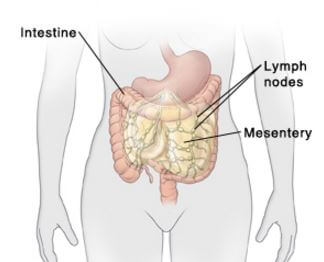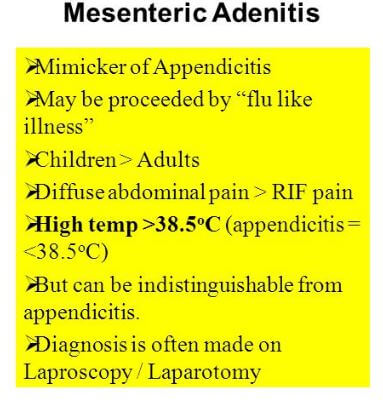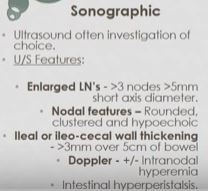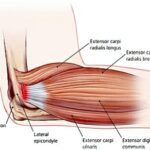What is Mesenteric Adenitis?
Mesenteric adenitis is a condition in which the lymph nodes at the mesentery (mesentery- the tissue that connects the intestine to the lining of the abdominal wall) in the abdomen become inflamed.
This condition is also known as mesenteric lymphadenitis, and its clinical presentation (a constellation of particular physical signs and symptoms whose interpretation point to a particular illness) resembles that of acute appendicitis.

- Shows a transverse ultrasound image taken through the right lower side of the belly or abdomen and it shows two lobular masses adjacent to each other (as indicated by the arrows). The masses show echogenic areas consistent with lymph nodes.
- Transverse ultrasound image taken through the lower abdomen also showing important lymph nodes within the mesenteric fat (as shown by the arrows) as seen from the surrounding echogenic areas.
What are Lymph Nodes?
Lymph nodes also referred to as lymph glands are lumps of tissues the size of pea that contain white blood cells. They occur throughout the body and are a major part of the body’s defense or immune system.
When the body is fighting infection these glands usually swell up and then recover after the infection. Glands in the neck swell when you have sore throat or tonsillitis, during mesentery adenitis the glands in the abdomen next to the gut swell up in the same way.
Who are Commonly Affected?
Mesenteric adenitis is a condition thataffects both male and female equally. It is more common among children and adolescents, this is basically individuals under the age of 16 years.
What causes Mesenteric Adenitis?
The most common cause of mesenteric adenitis is infection within the body. However cancer can also cause inflammation of the mesenteric lymph nodes. The following are some of the causes of mesenteric adenitis:
Cancer
Cancer can cause swelling of the abdominal lymph nodes and cause mesenteric adenitis such form of cancer include lymphoma, which is cancer affecting the lymphocytes (white blood cell type, responsible for fighting infection), breast cancer, lung cancer, pancreatic cancer, lung cancer and gastrointestinal cancer.
Gastroenteritis
This is an infection that leads to irritation and inflammation of the stomach and the intestine and is one of the causes of Mesenteric Adenitis through swelling of the lymph nodes in the belly. It may be as a result of viral causes which affect the digestive tract such as rotavirus or norovirus, or as a result of bacterial infection such as salmonella, staphylococcus or streptococcus.
In children the most common cause of mesenteric adenitis is the bacterium Yersinia enterocolitica, which causes gastroenteritis among children, leading to swelling of the lymph nodes of the belly.
Tuberculosis
This is a bacterial infection that normally affects the lungs but it also affect other parts of the body such as the intestine, sexual organs, bone and also the lymph nodes at the root of the lungs. It therefore leading to mesenteric adenitis by causing the lymph nodes in the abdominal region to swell.
Whipple disease
Disease such as the Whipple disease which is a bacterial infection affecting the intestine can cause mesenteric adenitis when lymph nodes around the region swell (lymph in the mesenteric region).
Appendicitis
An inflammation of the appendix also causes mesenteric adenitis.
Connective Tissue Diseases
Connective tissue diseases such as lupus, sclerosis and rheumatoid arthritis also cause mesenteric adenitis.
Pancreatitis
This is the inflammation of the pancreas also causes mesenteric adenitis.
Diverticulitis
An inflammation at the large intestine’s lining causes mesenteric adenitis.
HIV
HIV causes mesenteric adenitis.
Signs and Symptoms

There are many symptoms and signs associated with mesenteric adenitis and they include:
- Pain or tenderness in the belly, the pain is usually near the belly button. Pain may also be in the lower right side of the belly.

- Fever characterized by high body temperature
- Generally feeling sick
- Loss of appetite
- Nausea, vomiting or diarrhea
- Sore throat or symptoms related to a cold might also have appeared prior to experiencing the abdominal pain
- Feeling fatigued or a lack of energy
- Raised white blood cell count.
Diagnosis

Treatment
You can treat mesenteric adenitis by treating the disease that is infecting the body currently. Here are some of the ways:
Antibiotics
- By administering antibiotics if a bacterial disease is infecting the body and causing mesenteric adenitis. Such antibiotics include Amoxil, Polymox, Penicillin, Pedizole etc.
Antiretroviral drugs
- By administering antiretroviral drugs to people infected by HIV, which is the cause for mesenteric adenitis. It is important to note that even though retroviral drugs don’t cure HIV, they help reduce its symptoms. Such drugs include Zidovudine, Lamivudine, Efavirenz etc.
Surgery
- Where mesenteric adenitis is caused by cancer, chemotherapy or radio therapy can be done. Here curing the cancer means treating mesenteric adenitis. Where cancer results in tumor within the stomach, intestine or the pancreas it can be removed surgically.
OTC Medicines
- Over the counter pain relievers and fever reducers can also be used to relieve discomfort as well as alleviate some of the symptoms if not cure mesenteric adenitis completely.
Rest
- Resting and applying warm heat to the abdomen may also help to alleviate the symptoms.
AntiVirals
- Taking of antivirals to cure infections caused by viruses, since viruses also cause mesenteric adenitis.
- Ensuring you are properly hydrated by drinking plenty of water as well as some electrolyte solutions.
Conclusion
Mesenteric adenitis is a condition that results mostly as a response to an infection and therefor is not a condition that can be treat independently. It can also be as a result of cancer, which may be directly or indirectly affecting the lymph nodes.
Mesenteric adenitis may go away on its own because it is usually benign but it is advisable to see a doctor because in some cases it may be caused a bacterium which may be fatal and can cause death.
It is also important to see the doctor because the symptoms of mesenteric adenitis are quite similar to that of appendicitis. However it is possible to alleviate the symptoms of mesenteric adenitis through means that are quite common to us such as taking a rest, drinking plenty of water or some electrolyte solution, or the taking of some over the counter pain relievers.
Reference List:
- Mesenteric Lymphadenitis, available at http://www.webmd.com/children/mesenteric-lymphadentitis#1
- How is mesenteric adenitis treated?, available at https://www.healthgrades.com/right-care/digestive-health/mesenteric-adenitis–treatments
- Mesenteric Adenitis, available at http://patient.info/health/mesenteric-adenitis
- Swollen Lymph Nodes from HIV, available at http://www.healthline.com/health/hiv-aids/swollen-lymph-nodes#HIVandlymphnodes3
- Symptoms and Causes, available at http://www.mayoclinic.org/diseases-conditions/mesenteric-lymphadenitis/symptoms-causes/dxc-20214657
- Mesenteric lymphadenitis caused by Yersinia enterocolitica, available at https://www.ncbi.nlm.nih.gov/pmc/articles/PMC4631276/






